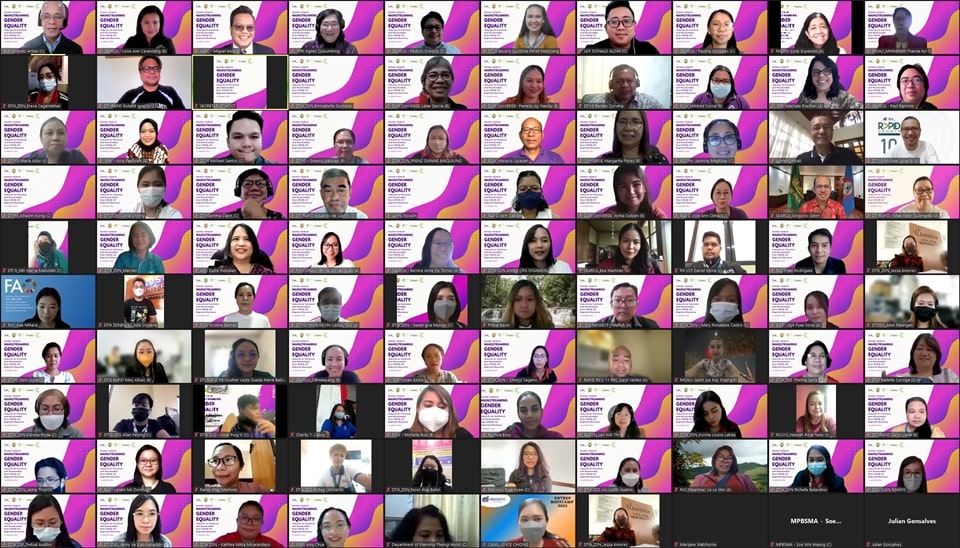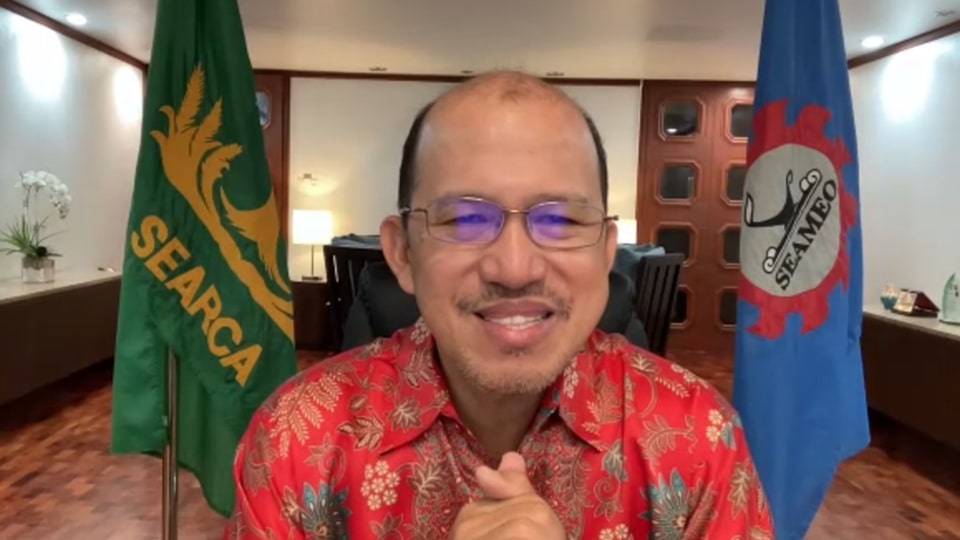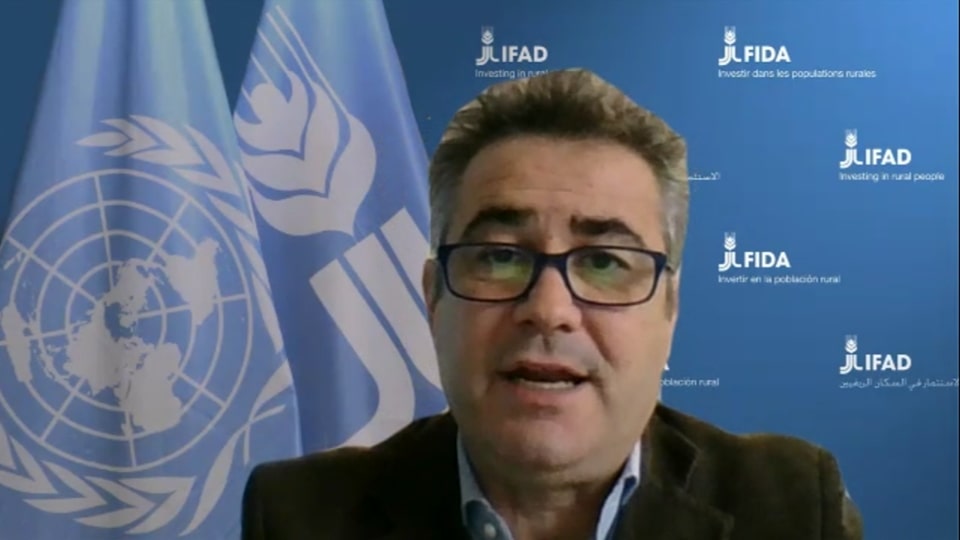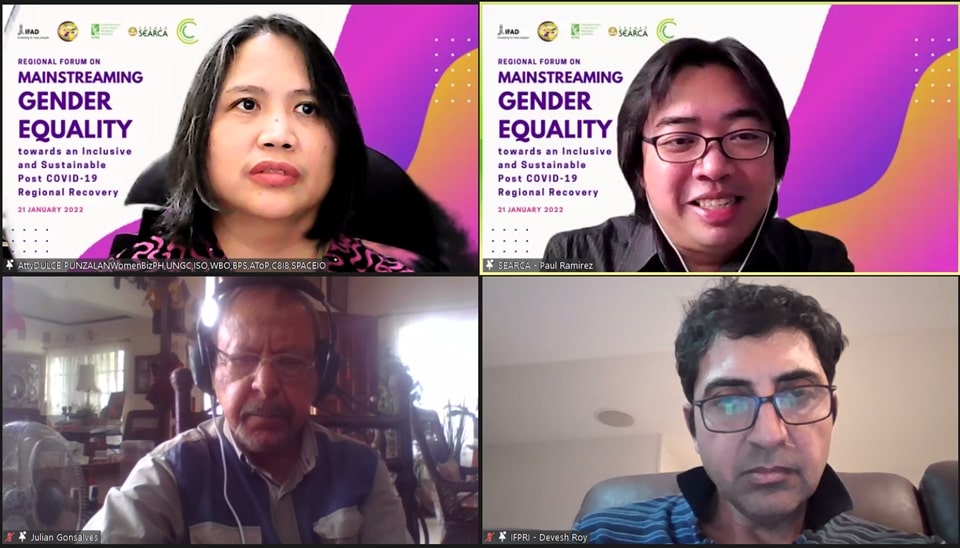
The International Fund for Agricultural Development (IFAD)-funded project, Agricultural Transformation and Market Integration in the ASEAN Region: Responding to Food Security and Inclusiveness Concerns (ATMI-ASEAN), and the IFAD Philippines Gender Network (IPGN) hosted a regional forum on “Mainstreaming Gender Equality towards an Inclusive and Sustainable Post-COVID 19 Regional Recovery” on 21 January 2022 via Zoom.
The forum served as a venue for local and international experts’ sharing and discourse on gender mainstreaming in Southeast Asia and to come up with recommendations on how existing initiatives can be scaled up and adopted to complement and support the implementation of the ASEAN Comprehensive Recovery Framework (ACRF).

Dr. Glenn Gregorio, the Director of the Southeast Asian Regional Center for Graduate Study and Research in Agriculture (SEARCA), highlighted the timeliness of the forum, especially on emphasizing the “frontline” role, which transcended gender norms and biases, that the agriculture sector and key players took in response to the limitations brought about by the pandemic. He also mentioned the importance of partnerships among organizations in providing an in-depth knowledge and co-creation platform as the region welcomes new movements in the emerging digital sphere and gears towards the ASEAN Gender Outlook. Dr. Gregorio, therefore, enjoined everyone to participate in the forum as the experiences and different cultural backgrounds of the participants would contribute to the discussion and realization of the transformative impacts of empowering men, women, the youth, and indigenous communities to manage the challenges in the region’s agricultural sector.

In his opening message, Mr. Alessandro Marini, IFAD’s Country Director for the Philippines and Myanmar, thanked the IPGN, the ATMI-ASEAN Project implementers, IFPRI and SEARCA, and the IFAD Philippines Country Office and IFAD Headquarters for spearheading the forum. Mr. Marini explained that gender is one of the four key mainstreaming thematic priorities of IFAD in terms of investments and operations and that the IPGN has been instrumental in ensuring that the quality of IFAD operations in the country, particularly with respect to mainstreaming gender equality, is high, by facilitating knowledge exchanges and sharing of lessons among the different projects. He also stressed how workshops like this could support IFAD in harvesting knowledge and best practices that would help further improve the effectiveness of its operations.
SEARCA, through its Research and Thought Leadership Department (RTLD) led by Dr. Pedcris Orencio, co-implements with the International Food Policy Research Institute (IFPRI) the ATMI-ASEAN Project in five target ASEAN Member States (AMS): Cambodia, Lao PDR, Myanmar, Philippines, and Vietnam. The ATMI-ASEAN Project is one of the several IFAD-funded programs in which SEARCA is involved. In explaining the rationale behind the conduct of the forum, Dr. Orencio emphasized that mainstreaming gender equality must be at the heart of the recovery agenda as this is crucial to development, such as achieving gender-balanced programs that are not given much attention during a crisis. By making the policymaking process more inclusive for women and men, better governance systems can be achieved. He also added that given the differences in their needs, differential approaches should be applied in addressing their concerns, especially amid the pandemic.
Mr. Miguel Rafael Musngi, Senior Officer, Poverty Eradication and Gender Division, ASEAN Secretariat, presented the ACRF and the ASEAN Gender Outlook, which complemented the presentations of Mr. Steven Jonckheere, Senior Technical Specialist for Gender & Social Inclusion of IFAD on the organization’s current gender equality and women’s empowerment initiatives, and of Dr. Agnes Quisumbing, Senior Research Fellow of IFPRI on the reach-benefit-empower framework for gender equality in agriculture.

SEARCA, through the ATMI-ASEAN Project, hosted a panel session to discuss specific gender mainstreaming strategies on three selected key priority topics under the ACRF including: (1) food and nutrition security by Dr. Devesh Roy, Senior Research Fellow, IFPRI; (2) climate change and disaster resilience, by Dr. Julian Gonsalves, Senior Advisor, International Institute of Rural Reconstruction (IIRR); and (3) digital technologies in agriculture, by Atty. Dulce Blanca Punzalan, Chief Executive Officer, Crea8 Innov8 Marketing. Mr. Paul Joseph Ramirez, ATMI-ASEAN Project Support Unit (PSU) Coordinator, facilitated the panel discussion. The three topics were also the focus of the IPGN-facilitated breakout session, wherein participants from different countries shared their gender-related programs and initiatives. Each group also provided recommendations and proposed courses of action to support and complement the implementation of the ACRF.
Ms. Rhine Joy Lesigues, Chair of the IPGN and the Institutions and Gender Specialist (IGS) of the IFAD-supported project Fisheries, Coastal Resources and Livelihood Project (FishCORAL), recommended that in moving forward, IPGN should strive to extend its membership and broaden its reach by implementing activities and providing support to other gender-related programs in the Asia-Pacific region. This will be an opportunity for the Network to capacitate IFAD-supported projects and link them with regional gender experts as well as to document gender issues, strategies, and lessons learned through knowledge-sharing activities.
Dr. Shahidur Rashid, Director of IFPRI-South Asia, expressed his gratitude to the organizers and the continuous support of the ASEAN Secretariat through the participation of the ASEAN Committee on Women (ACW) in the Forum. Sharing his vision about gender issues amid the pandemic, Dr. Rashid suggested the following to better understand gender mainstreaming: (a) knowing gender differential effects in the food system; (b) looking beyond food security to include food safety, nutrition, and overall health security; and that (c) climate change is an “existential challenge” for the region. He also emphasized that mainstreaming gender equality is a lifetime endeavor, and those working to promote this should continuously strive to open spaces for multistakeholder discussions and encourage equal representation in all aspects of the policy-making process such as in the case of COVID-19 response planning and decision making.
Mr. Yolando Arban, IFAD Philippines’ Special Adviser and Acting Country Programme Officer, who also served as the Forum Facilitator, formally closed the event by thanking the participants and ensuring IFAD’s continuous commitment to support gender empowerment and transformation, especially in the field of agriculture and rural development where many women and girls are vulnerable.
Around 190 participants from government agencies and ministries in the region; from international and regional institutions, such as the ASEAN Secretariat, Food and Agriculture Organization (FAO), Grow Asia and its country partnerships; from civil society organizations in the region such as the Asian Partnership for the Development of Human Resources in Rural Asia (AsiaDHRRA) and its country offices, Asian Farmers’ Association for Sustainable Rural Development (AFA) and its member-organizations, and at the local level such as the Philippine Commission on Women (PCW), Ministry of Women Empowerment and Child Protection (MoWECP) in Indonesia, Ministry of Women, Family and Community Development (MWFCD) in Malaysia, and Ministry of Social Welfare, Relief and Resettlement (MSWRR) in Myanmar, among others; from the ATMI-ASEAN Project implementers and country partner-institutions; and from IFAD-supported projects in the Philippines, attended the forum.